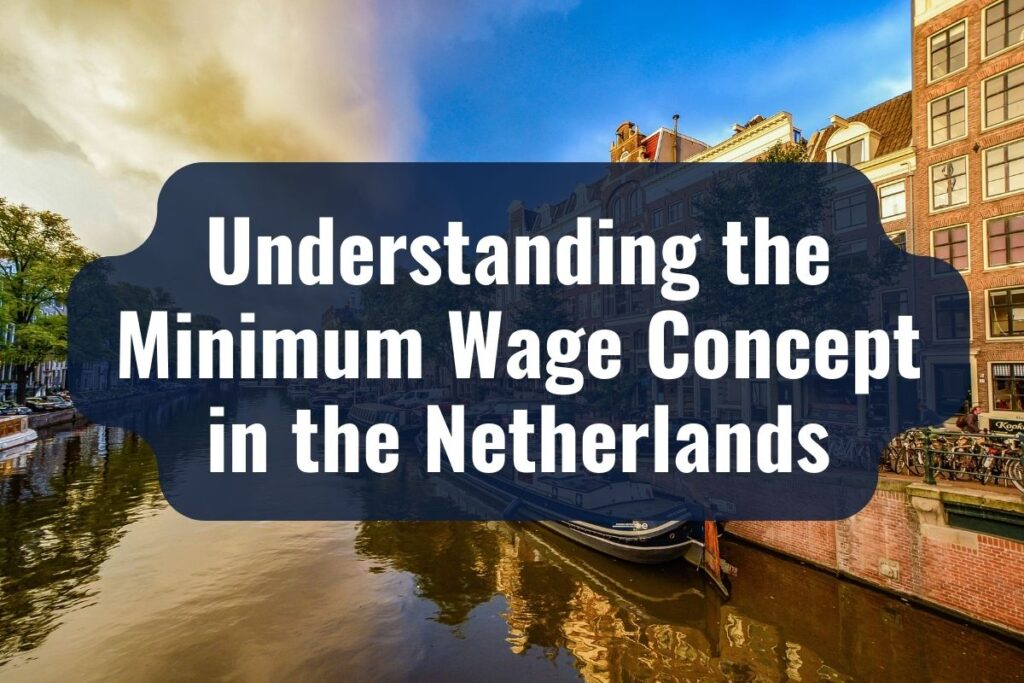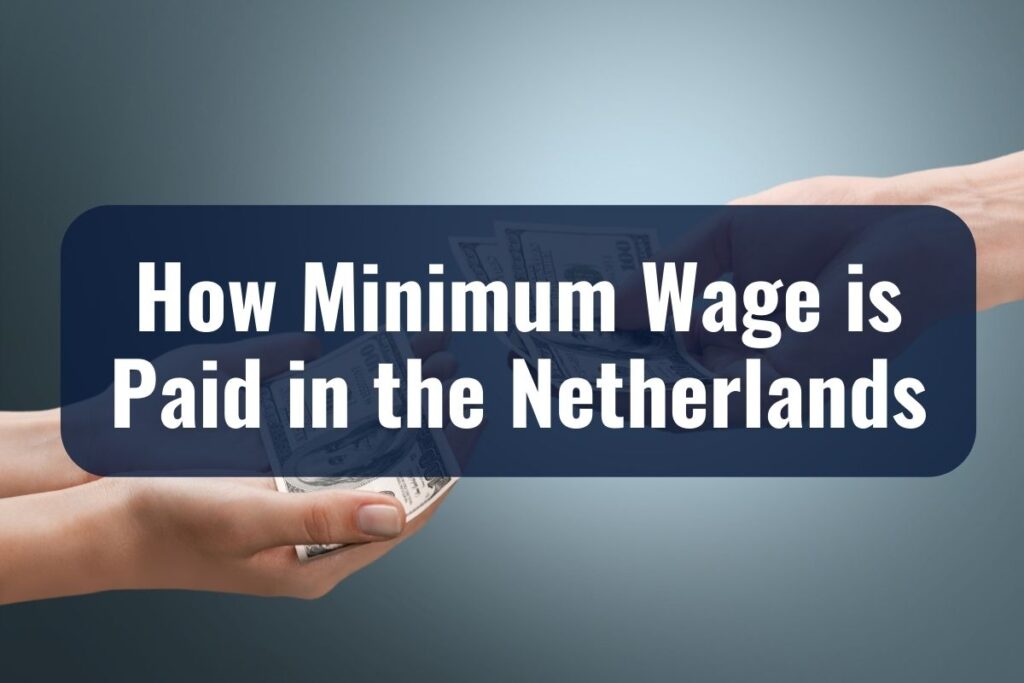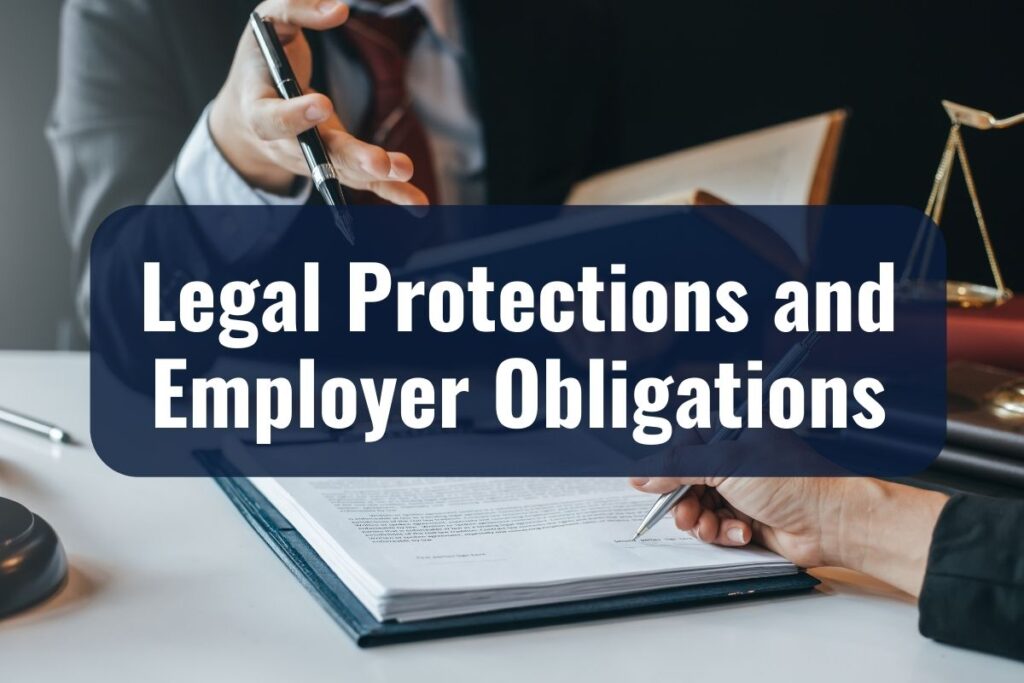The Netherlands, known for its picturesque landscapes, advanced infrastructure, and high standard of living, also maintains a strong commitment to worker’s rights and fair compensation. This emphasis on ensuring equitable treatment extends to everyone working within its borders – irrespective of nationality. Hence, getting a firm grasp on the concept of the minimum wage in the Netherlands, a cornerstone of the Dutch labor market, is instrumental for every foreigner seeking employment or currently employed in the country.
We will take you through the ins and outs of the Dutch minimum wage system, its implications for your work, and the broader financial considerations. Presented in a clear, authoritative, and easily understandable manner, our aim is to help you navigate this crucial aspect of your life in the Netherlands with confidence and ease.
Current Minimum Wage Rates in the Netherlands
Current Minimum Wage in the Netherlands
The current minimum wage for 21 years and older:
| 21 Years & Older | Euro (€) | U.S. Dollars ($) |
|---|---|---|
| Hourly (40h/week) | €11.51 | $12.89 |
| Monthly | €1,995.00 | $2,235.60 |
| Yearly | €23,940.00 | $26,827.20 |
See the full information in the table below.
The Dutch government reviews and adjusts the minimum wage figures twice a year, in January and July. This means that the rates are subject to change, and it’s crucial to stay updated with the most current information.
| Age | Per Month (€) | Per Month ($) | Per Week (€) | Per Week ($) | Per Day (€) | Per Day ($) | Hourly (36h/week €) | Hourly (36h/week $) | Hourly (38h/week €) | Hourly (38h/week $) | Hourly (40h/week €) | Hourly (40h/week $) |
|---|---|---|---|---|---|---|---|---|---|---|---|---|
| 21 years & older | 1,995.00 | 2,235.60 | 460.40 | 515.65 | 92.08 | 103.13 | 12.79 | 14.32 | 12.12 | 13.57 | 11.51 | 12.89 |
| 20 years | 1,596.00 | 1,787.52 | 368.30 | 412.49 | 73.66 | 82.50 | 10.24 | 11.47 | 9.70 | 10.86 | 9.21 | 10.32 |
| 19 years | 1,197.00 | 1,340.64 | 276.25 | 309.40 | 55.25 | 61.88 | 7.68 | 8.60 | 7.27 | 8.14 | 6.91 | 7.74 |
| 18 years | 997.50 | 1,117.20 | 230.20 | 257.82 | 46.04 | 51.56 | 6.40 | 7.17 | 6.06 | 6.79 | 5.76 | 6.45 |
| 17 years | 788.05 | 882.21 | 181.85 | 203.67 | 36.37 | 40.73 | 5.06 | 5.67 | 4.79 | 5.36 | 4.55 | 5.10 |
| 16 years | 688.30 | 770.89 | 158.85 | 177.91 | 31.77 | 35.58 | 4.42 | 4.95 | 4.19 | 4.69 | 3.98 | 4.46 |
| 15 years | 598.50 | 670.32 | 138.10 | 154.67 | 27.62 | 30.93 | 3.84 | 4.30 | 3.64 | 4.08 | 3.46 | 3.88 |
The Dutch government provides a comprehensive table showing the minimum wage rates corresponding to each age category, which is a great resource for finding the specific figures applicable to your situation. Additionally, this table details the minimum wage for part-time workers, calculated on a pro-rata basis.
It’s important to understand that these figures represent the bare minimum you should be earning for your work. Many roles, particularly those requiring specialized skills or qualifications, may offer salaries significantly higher than these figures.
Understanding the Minimum Wage Concept in the Netherlands

In the world of work, the term ‘minimum wage’ frequently surfaces. But what does it mean specifically in the Dutch context? Essentially, the minimum wage is the lowest compensation that employers can legally pay their employees. This base level of pay is set by the Dutch government and is designed to safeguard workers from exploitation, ensuring they receive a fair wage for their labor.
The Netherlands introduced the Minimum Wage and Minimum Holiday Allowance Act (WML) in 1969. This law is the cornerstone of wage regulation in the country, aimed at providing a basic level of income that enables a decent living standard for workers. The government reviews and, if necessary, revises the minimum wage figures twice a year, on 1st January and 1st July, to accommodate changes in average collective wage levels in the country.
Importantly, the Dutch minimum wage is age-dependent, with different rates applicable for workers between the ages of 15 and 22, and a standard minimum wage set for those aged 23 and above. The underlying idea is to strike a balance between fair pay and the encouragement of employment among younger workers, who are typically less experienced.
How the Minimum Wage in the Netherlands Compares Internationally
When it comes to the minimum wage, the Netherlands stands amongst the top-ranking countries in the European Union. The Dutch minimum wage is higher than many of its EU counterparts, including countries like Spain, Poland, and Hungary. However, a few countries such as Luxembourg and Ireland report slightly higher minimum wage levels.
Nonetheless, it’s vital to remember that minimum wage figures cannot be viewed in isolation. They are only one component of a broader socioeconomic picture. The cost of living, which varies significantly from one country to another, plays an instrumental role in determining the actual value of the minimum wage. For instance, while the minimum wage in the Netherlands might be higher than in Spain, the cost of living in the Netherlands is also generally higher. This factor needs to be taken into account when comparing minimum wages internationally.
Additionally, various social security benefits and the taxation system also greatly influence the take-home pay and living standard, and the Netherlands has a comprehensive social security system that provides numerous benefits to workers.
How Minimum Wage is Paid in the Netherlands

In the Netherlands, wages are typically paid at the end of each month, directly into your bank account. This is a standard practice, providing convenience, security, and transparency for both employers and employees. It’s advisable to set up a Dutch bank account upon your arrival in the country to ensure a smooth transaction process.
Minimum wage regulations in the Netherlands also account for those working part-time or on an hourly basis. If you are a part-time employee, your minimum wage will be calculated proportionally, based on the number of hours you work. For instance, if a full-time role comprises 40 hours per week and you work 20 hours, you should earn at least half of the prescribed full-time minimum wage.
On a similar note, for those working on an hourly basis, the minimum wage is calculated by dividing the full-time weekly wage by the number of working hours in a week, as determined by your sector’s standard. For example, if the full-time working week in your sector is 38 hours, and the full-time weekly wage is €400, the hourly minimum wage would be roughly €10.53.
It’s worth noting that the Dutch law mandates payment of holiday allowance, known as ‘vakantiegeld’. This is calculated as 8% of your gross annual salary and is typically paid out once a year, usually in May, or added to your monthly wage.
Legal Protections and Employer Obligations

The Dutch government is dedicated to the protection of worker rights, and as such, a robust legal framework exists to ensure that all workers receive fair and just treatment.
As a fundamental part of the Dutch labor system, the minimum wage is legally binding. This means that employers are obligated to pay their employees at least the statutory minimum wage. Failing to do so can result in legal action and penalties for the employer. It’s essential to know that this law applies to all workers, regardless of their nationality, part-time or full-time status, or the type of their employment contract.
In the Netherlands, your employer is also required to provide a clear and comprehensible payslip with each payment. This payslip should detail your gross wage, the amount of taxes and contributions deducted, and your resulting net wage. This transparency is aimed to ensure that you can easily check if you’re receiving at least the minimum wage.
Moreover, as mentioned earlier, employers are obligated to pay you an annual holiday allowance, equivalent to 8% of your gross annual wage. This payment is usually disbursed in May, providing an extra financial boost just before the summer holiday period.
If you suspect that your wage does not meet the minimum wage requirements or that your employer is neglecting other legal obligations, it’s advisable to first discuss the issue with your employer. If this doesn’t resolve the situation, you can contact the Netherlands Labour Authority (Formerly known as ‘Inspectie SZW’) for assistance. They have the power to impose penalties on employers who do not comply with the minimum wage legislation.
Impact of Minimum Wage on Work Visas and Student Visas
Navigating the intricacies of visas can often be a complex endeavor, particularly when you’re also trying to understand the impact of the minimum wage on your employment conditions. The Dutch immigration policies, while comprehensive, are stringent about certain requirements, including wage levels, especially for those on work visas and student visas. Let’s delve into how the minimum wage impacts these.
If you’re in the Netherlands on a work visa, your employer is obligated to pay you at least the statutory minimum wage. This condition is part of the sponsorship agreements your employer enters into with the Dutch immigration authorities. Your wages need to meet the prescribed levels for your visa to remain valid.
However, it’s important to note that for highly skilled migrants and those under the European Blue Card scheme, the minimum wage requirements are higher than the standard statutory minimum wage. These wage thresholds are updated twice a year, corresponding with changes in the Dutch minimum wage.
For international students, the regulations are slightly different. If you’re on a student visa, you’re allowed to work a limited number of hours alongside your studies – 16 hours per week during term time or full-time during June, July, and August. Regardless of the hours you work, your wages must meet the pro-rata minimum wage standards.
Related: All you have to know about student loans in the Netherlands
One unique aspect of the Dutch labor system is that if you’re under 21 and work over 12 hours a week, your employer must also contribute to your healthcare insurance costs. This contribution is separate from your wages and is directly paid to your health insurer.
- Government of the Netherlands: The official government website provides accurate and up-to-date information about the current minimum wage rates and labor laws in the Netherlands.
- Netherlands Labour Authority: The Netherlands Labour Authority can assist if you suspect that your employer is not paying you the minimum wage or if you have other labor-related concerns.
- ACCESS Netherlands: A not-for-profit organization that supports the international community in the Netherlands. They provide a wealth of resources and services, including counseling and courses. See their website here.
- The Dutch Trade Union Confederation (FNV): The FNV can provide support and advice on a range of issues, including wages, working conditions, and contracts. FNV’s Website.
- The Dutch Association of Industry-wide Pension Funds (VB): This site contains valuable information on pension rights and how the Dutch pension system works. VB’s English Website.
- IND (Immigration and Naturalisation Service): They provide detailed and updated information about the wage criteria for work visas and student visas. IND’s Website.
FAQs
How can I check if I’m receiving the correct minimum wage?
Your payslip provides detailed information about your wages. Make sure to cross-reference the amount you receive with the current minimum wage for your age group, as published by the Dutch government. If you’re working part-time or on an hourly basis, calculate your pro-rata or hourly minimum wage accordingly.
What should I do if I’m not receiving the minimum wage?
If you suspect you’re not being paid the correct minimum wage, the first step is to discuss the issue with your employer. If this doesn’t resolve the matter, you can contact the Dutch labor inspectorate, Inspectie SZW, for advice and potential legal recourse.
Are interns entitled to the minimum wage in the Netherlands?
Interns are not typically covered by minimum wage laws in the Netherlands. Instead, they usually receive an internship allowance. However, if the nature of your internship closely resembles regular employment, you might be entitled to the minimum wage.
Does the minimum wage apply to foreign workers?
Yes, the Dutch minimum wage applies to all workers in the Netherlands, regardless of their nationality.
How often is the minimum wage adjusted?
The Dutch minimum wage is reviewed and adjusted, if necessary, twice a year, on January 1st and July 1st.



